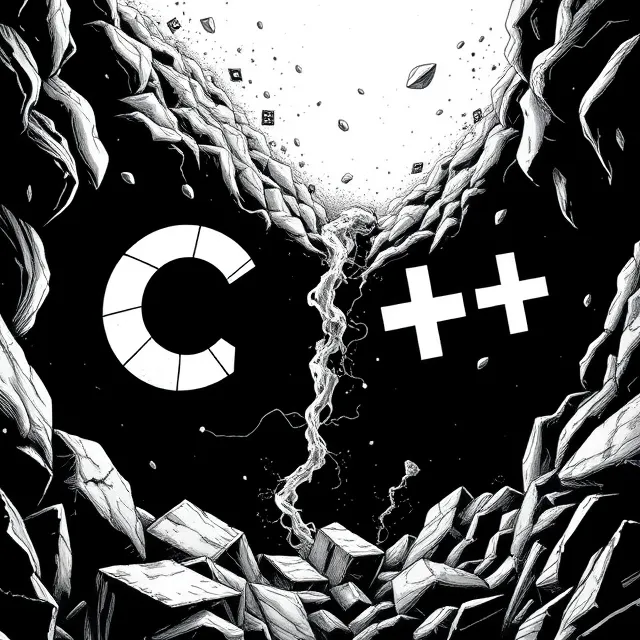Cpp against C - A Humble Programmer Comparison
C and C++ are both revered in the software development world for their power, efficiency, and deep control over system resources. However, each language brings its own set of strengths and weaknesses, making them more or less suitable depending on the use case. This comparison is crafted to reflect a nuanced, modern engineering perspective, providing insights into their capabilities for both legacy and contemporary development.
Key Considerations in Choosing Between C and C++
| Feature | C | C++ |
|---|---|---|
| Programming Paradigm | Procedural, low-level | Multi-paradigm (Object-Oriented, Procedural, and Generic) |
| Memory Management | Manual, using malloc, free | Manual with new, delete, and smart pointers (std::unique_ptr, std::shared_ptr) |
| Error Handling | Error codes, setjmp/longjmp | Structured exception handling (try, catch, throw) |
| Complexity & Readability | Simpler, straightforward syntax | More complex with templates, classes, and OOP concepts |
| Abstraction | Minimal abstraction, low-level access | High-level abstractions with classes, templates, and polymorphism |
| Runtime Performance | Faster, minimal runtime overhead | High performance with object-oriented overhead but often competitive |
| Compile-Time Complexity | Fast compilation | Slower compilation due to templates, heavy optimizations |
| Ecosystem | Basic library support, low-level control | Extensive libraries (STL, Boost), high-level abstractions |
C: Low-Level and Direct Access to Hardware
1. Simplicity and Control
C is renowned for its simplicity and close-to-hardware programming capabilities. One of the reasons C has been the go-to language for embedded systems, operating systems, and high-performance computing is its minimalist approach.
“In C, you’re working directly with the machine, using simple concepts like pointers and memory addresses. It’s a straightforward, no-nonsense way to write efficient code.” – Senior Embedded Systems Developer
C provides manual memory management and allows developers to optimize low-level details like memory alignment, pointer manipulation, and bit-level operations. This results in performance optimizations that can be crucial in systems programming, where every bit counts.
NOTEC is the language of choice in embedded systems, firmware, and OS kernels, where the developer’s ability to control memory and hardware resources directly is paramount.
2. Performance-Driven Design
C does not have the overhead associated with complex features like object-oriented programming, which means that compiled C code is extremely fast.
“C’s lack of abstractions is actually a strength when you’re building high-performance systems that require direct interaction with hardware.” – Performance Engineer
This absence of overhead ensures that C remains ideal for real-time systems, microcontrollers, and environments where execution time and resource constraints are the most important considerations.
3. Legacy Code and Industry Adoption
C has been the backbone of system software for decades. Many legacy systems, especially in telecommunications, aerospace, and hardware interfaces, are still written in C because of its direct control over system resources. For a modern engineer working on such systems, understanding C and its constraints is a necessity.
WARNINGDespite C’s simplicity, the absence of higher-level abstractions means that software built in C can quickly become unmanageable for large, evolving codebases.
C++: Modern and Flexible with Object-Oriented Design
1. Object-Oriented Programming
C++ was designed as an extension of C to support object-oriented programming (OOP). By introducing classes and objects, C++ allows developers to structure their code in a way that promotes modularity and reusability. OOP enables you to encapsulate data and behavior together in a class, helping to maintain a cleaner, more organized codebase as applications scale.
“C++ allowed us to architect large-scale systems in a much more structured manner. The ability to model real-world objects as classes and interact with them through well-defined interfaces was a game-changer for maintainability.” – Senior Software Engineer at a large tech company
With C++, concepts like inheritance, polymorphism, and encapsulation allow for flexible designs. This is beneficial when creating complex applications like game engines or GUI frameworks, where objects need to interact in a dynamic and flexible way.
IMPORTANTC++‘s OOP features are invaluable when building large-scale applications that require extensibility and maintainability. For smaller systems or those constrained by memory and performance, C’s low-level nature may be more appropriate.
2. Modern Features: Smart Pointers and Exception Handling
Modern C++ (C++11 and beyond) introduced powerful features like smart pointers (std::unique_ptr, std::shared_ptr), which help manage memory more safely and efficiently compared to raw pointers. These tools reduce the risk of memory leaks and dangling pointers, problems that are common in C programs.
“Smart pointers in modern C++ are an absolute must for safe memory management. They automate a lot of the work that you would have to manually manage in C, which makes the code less error-prone.” – C++ Expert Developer
In addition, C++ provides exception handling via try, catch, and throw keywords, offering a more structured and maintainable approach to error handling compared to C’s traditional error codes or setjmp/longjmp mechanism.
CAUTIONC++‘s advanced features like templates, lambdas, and exception handling can introduce significant complexity. Misusing them can lead to difficult-to-maintain codebases, especially when developers lack experience with modern C++ paradigms.
3. Template Programming and Generic Programming
A key advantage of C++ over C is the ability to use templates, which allow for generic programming. Templates enable developers to write functions and classes that can operate on any data type, providing the flexibility of type-safe code reuse.
“Templates are an excellent way to write flexible, reusable code. With C++, I can create libraries like the STL that work with any data type without needing to duplicate code.” – C++ Software Architect
Templates form the foundation for the Standard Template Library (STL), which provides powerful data structures and algorithms. With containers like std::vector, std::map, and std::list, developers can implement complex data manipulation tasks efficiently.
4. Performance and Efficiency in Modern C++
Despite its complexity, modern C++ can be as performant as C in most cases due to optimizations and advanced compiler technologies (like link-time optimization and just-in-time compilation). While there is some overhead due to object-oriented features, template metaprogramming and move semantics allow C++ code to approach the raw performance of C when needed.
“In some cases, the performance difference between C and C++ is negligible. The real benefit of C++ is the ability to manage complexity with better abstractions.” – Senior C++ Developer
Where to Use C vs C++
1. C: When Low-Level Control is Essential
C is unmatched when it comes to low-level programming, where direct access to memory and hardware is required. Its simplicity and minimal runtime overhead make it perfect for:
- Embedded systems
- Operating systems
- Real-time applications
- Hardware drivers
- Microcontroller programming
C’s primary strength lies in its ability to offer developers control over the hardware, memory, and execution flow, which is paramount in these use cases.
2. C++: When Abstraction and Modularity are Key
C++ shines when dealing with complex, evolving software projects that require high-level abstractions and modularity. This makes C++ the go-to language for:
- Game development
- High-performance applications
- Graphical user interfaces
- Large-scale software systems
- Libraries and frameworks
C++‘s features, such as classes, inheritance, and the Standard Template Library (STL), provide powerful tools for developers who need to manage complex systems without compromising on performance.
Conclusion: Which One is Better?
In conclusion, C and C++ are both indispensable in the modern developer’s toolkit. The choice between the two depends on the specific requirements of your project. C’s low-level power and simplicity make it perfect for embedded systems and performance-critical applications. On the other hand, C++ is better suited for larger, more complex applications where object-oriented programming, better error handling, and modern features like templates and smart pointers are crucial.
For high-level systems or applications where performance is key but maintainability and flexibility matter just as much, C++ often emerges as the preferred choice.
TIPIf you’re writing a small, performance-sensitive system where manual control is paramount, C is the ideal language. For larger systems with evolving requirements, C++ offers far more versatility and maintainability.


